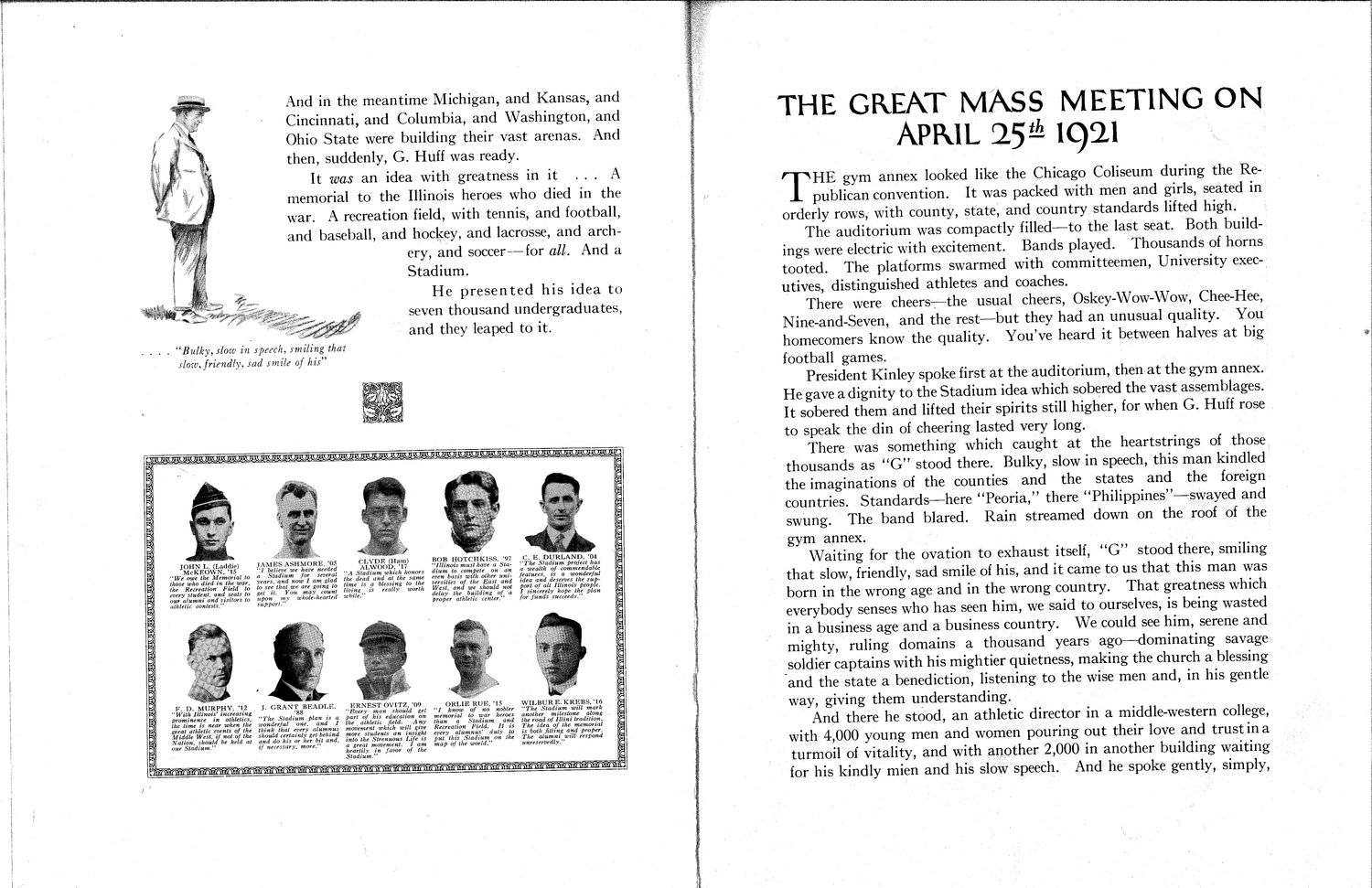| |
| |
Caption: Dedication - Memorial Stadium Drive Book #2
This is a reduced-resolution page image for fast online browsing.

EXTRACTED TEXT FROM PAGE:
i\nd in the meantime Michigan, and Kansas, and Cincinnati, and Columbia, and Washington, and Ohio State were building their vast arenas. And then, suddenly, G. Huff was ready. It was an idea with greatness in it . . . A memorial to the Illinois heroes who died in the war. A recreation field, with tennis, and football, and baseball, and hockey, and lacrosse, and archery, and soccer—-for all. And a Stadium. He p r e s e n t e d h i s idea t o seven thousand undergraduates, and they leaped to it. "Bulky, slow in speech, smiling that slozv, friendly, sad smile of his" THE GREAT MASS MEETING ON APML 25& 1921 T H J O H N L. (Laddie) M c K E O W N , '15 "We owe the Memorial to those who died in the war, the Recreation Field to every student, and seats to our alUmni and visitors to athletic contests." J A M E S A S H M O R E , '05 " / believe we have needed a Stadium for several years, and now I am glad to see that we are going to get it. You may count upon my whole-hearted support." C L Y D E (Ham) ALWOOD, '17 "A Stadium which honors the dead and at the same time is a blessing to the living is really worth while." BOB H O T C H K I S S , '97 "Illinois must have a Stadium to compete on an even basis with other universities of the East and West, and we should not delay the building of a proper athletic center." C. E . D U R L A N D , '04 "The Stadium project has a wealth of commendable features, is a wonderful idea and deserves the support of all Illinois people. I sincerely hope the plan for funds succeeds." J. G R A N T B E A D L E , F . D . M U R P H Y , '12 '88 "With Illinois' increasing prominence in athletics, "The Stadium plan is a wonderful one, and I the time is near when the great athletic events of the think that every alumnus Middle West, if not of the should certainly get behind Nation, should be held at and do his or her bit and, if necessary, more." our Stadium." E R N E S T OV1TZ, '09 "Every man should gel part of his education on the athletic field. Any movement which will give more students an insight into the Strenuous Life is a great movement. I am heartily in favor of the Stadium." O R L I E R U E , '15 "I know of no nobler memorial to war heroes than a Stadium and Recreation Field. It is every alumnus' duty to put this Stadium on the map of the world." W I L B U R E. K R E B S , '16 "The Stadium will mark another milestone along the road of Illini tradition. The idea of the memorial is both fitting and proper. The alumni will respond unreservedly." ^gggMMw^wra^^ H E gym annex looked like the Chicago Coliseum during the Republican convention. It was packed with men and girls, seated in orderly rows, with county, state, and country standards lifted high. The auditorium was compactly filled—to the last seat. Both buildings were electric with excitement. Bands played. Thousands of horns tooted. The platforms swarmed with committeemen, University executives, distinguished athletes and coaches. There were cheers—the usual cheers, Oskey-Wow-Wow, Chee-Hee, Nine-and-Seven, and the rest—but they had an unusual quality. You homecomers know the quality. You've heard it between halves at big football games. President Kinley spoke first at the auditorium, then at the gym annex. He gave a dignity to the Stadium idea which sobered the vast assemblages. It sobered them and lifted their spirits still higher, for when G. Huff rose to speak the din of cheering lasted very long. There was something which caught at the heartstrings of those thousands as " G " stood there. Bulky, slow in speech, this man kindled the imaginations of the counties and the states and the foreign countries. Standards—here "Peoria," there "Philippines"—swayed and swung. The band blared. Rain streamed down on the roof of the gym annex. Waiting for the ovation to exhaust itself, U G " stood there, smiling that slow, friendly, sad smile of his, and it came to us that this man was born in the wrong age and in the wrong country. T h a t greatness which everybody senses who has seen him, we said to ourselves, is being wasted in a business age and a business country. We could see him, serene and mighty, ruling domains a thousand years ago—dominating savage soldier captains with his mightier quietness, making the church a blessing and the state a benediction, listening to the wise men and, in his gentle way, giving them understanding. And there he stood, an athletic director in a middle-western college, with 4,000 young men and women pouring out their love and trust in a turmoil of vitality, and with another 2,000 in another building waiting for his kindly mien and his slow speech. And he spoke gently, simply,
| |